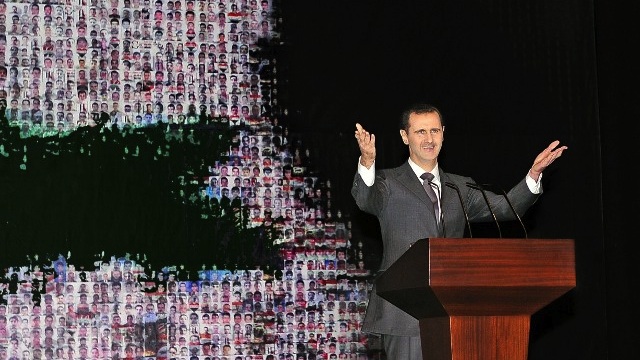SUMMARY
This is AI generated summarization, which may have errors. For context, always refer to the full article.

DAMASCUS, Syria (UPDATED) – Syrian President Bashar al-Assad offered a road map to end Syria’s civil war in a rare speech Sunday, January 6, in which he branded the opposition “slaves” of the West and told foreign powers to stop backing the rebels.
The main armed opposition group the National Coalition, swiftly rejected the plan and Washington said Assad’s speech, his first in public in seven months, showed he was “detached from reality”.
The European Union again called on him to step aside.
And Egyptian President Mohamed Morsi told CNN he backs Syrian calls for Assad to be tried for war crimes.
Assad, speaking to wild applause from ecstatic crowds packed into a Damascus cultural centre, outlined a plan he said was aimed at resolving the 21-month conflict which the United Nations says has claimed more than 60,000 lives.
The first step, he said, was for foreign powers to stop supporting armed rebels seeking to topple him.
“Right after that, our military operations will cease,” he said, adding, without elaborating, that a mechanism would be set up to monitor any such truce.
The government would then step up contacts to convene a national dialogue conference with opponents “inside and outside” Syria who do not take orders from abroad.
“We will hold dialogue with (those who are) the masters (of their decisions) not the slaves (of foreign powers),” Assad said.
The national dialogue conference would draft a charter which would then be put to a referendum. Parliamentary elections and the formation of a new government would follow, he said.
Any resolution of the conflict, however, had to be purely Syrian and “there must be agreement at the national dialogue conference”.
“We are now faced with a state of war in every sense of the word, an external aggression more deadly and dangerous than conventional wars implemented through a handful of Syrians and many foreigners,” Assad said.
He said the conflict was not between the government and the opposition but between the “nation and its enemies”, saying of his opponents: “This is not a loyal opposition but a gang of killers.
“The one thing that is sure (is) that those who we face today are those who carry the Al-Qaeda ideology,” Assad said, repeating previous assertions that “foreign terrorists” are behind the uprising.
The National Coalition, which insists Assad must step aside before any dialogue, said his speech was directed at those ready to see him remain in power.
Assad will not accept “any initiative that does not restore stability to his regime and put him at the helm of control”, spokesman Walid al-Bunni told AFP by phone.
“He wants negotiating partners of his own choosing and will not accept any initiative that could meet the aspirations of the Syrian people or ultimately lead to his departure and the dismantling of his regime.”
The Muslim Brotherhood in Syria said in a statement Assad’s plan represented “nothing”, and that he was “a war criminal waiting to be judged”.
US State Department spokeswoman Victoria Nuland said Assad’s speech “is yet another attempt by the regime to cling to power and does nothing to advance the Syrian people’s goal of a political transition. His initiative is detached from reality”, she said.
British Foreign Secretary William Hague said Assad’s first speech since June was full of “empty promises” and would “fool no one”.
In Brussels, a spokesman for EU foreign policy chief Catherine Ashton said: “We will look carefully if there is anything new in the speech but we maintain our position that Assad has to step aside and allow for a political transition”.
German Foreign Minister Guido Westerwelle called on Assad to order his security forces to end their violence, rather than making vague expressions of “readiness for a ceasefire”.
Speaking through a translator after being asked by CNN if he believed Assad should be tried by the Netherlands-based International Criminal Court, President Morsi of Egypt said: “The Syrian people, through their revolution, and through the movement will, when the bloodshed stops, move to a new stage where they will have an independent parliament and the government of their choosing”.
“And then they will decide what they want to do against those who committed crimes against them. It is the Syrian people who decide.
“This phase is the phase of the people. Similar to what the Egyptian people wanted, the Syrian people want it. And we support the Syrian people. And they are going to win and they have the will to win,” Morsi said, according to excerpts released by the network.
Assad last spoke in public on June 3 when he addressed parliament. In November, in an interview with Russian television, he rejected suggestions of exile, saying he would “live and die” in Syria.
During his latest visit to Damascus, UN-Arab League peace envoy Lakhdar Brahimi said he was working on a plan that he hoped would be acceptable to all major powers that envisaged a ceasefire, a transitional government and parliamentary and presidential elections.
As Assad spoke, the violence showed no let-up. The Syrian Observatory for Human Rights said at least 78 people, including 36 civilians, were killed nationwide on Sunday. – Rappler.com
Add a comment
How does this make you feel?
There are no comments yet. Add your comment to start the conversation.